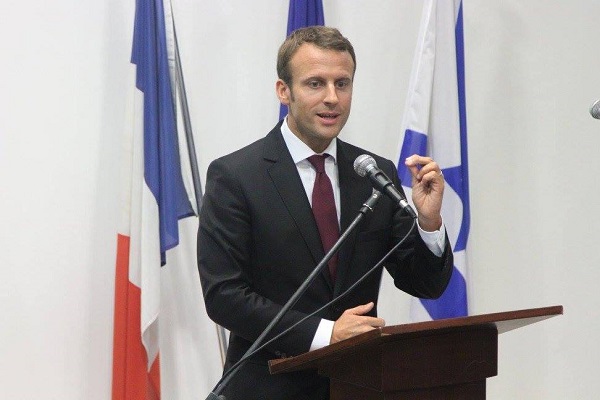FRESH AIR
UPDATES
Emmanuel Macron on Israel and France’s Jewish community
May 8, 2017 | Shmuel Levin

Shmuel Levin
As Emmanuel Macron claimed victory in the French Presidential election this week, French Jewish community leaders expressed relief. As Joel Mergui, President of the Israelite Central Consistory of France, wrote: Macron’s win “constitutes a veritable relief for all our nation and for the Jewish community of France”.
Similarly, France’s Chief Rabbi Haim Korsia expressed his satisfaction with Macron’s win. Before the election, Korsia had co-signed a political endorsement for Macron, together with Pastor François Clavairoly, president of the Protestant Federation of France, and Anouar Kbibech, president of the French Council of the Muslim Faith.
“Fully aware that our roles require us to be non-partisan, we are, however, first and foremost responsible citizens and therefore openly are calling for a vote in favour of Emmanuel Macron,” the three men wrote.
Following the election results, Korsia also noted his concerns for the support shown to conservative candidate Marine Le Pen. These concerns were echoed by European Jewish leaders and rabbis, who noted the rise of the far-right across the continent.
Notwithstanding this, Macron has drawn ire from the Jewish community in the past. In 2016, Macron criticised Jewish schools in comments that raised concern from community leaders. At the time, Macron stated:
“It is very important to maintain neutrality in the public sector… Religion cannot be present in school. But I hear few people becoming concerned by the consequences of this phenomenon, [with] more and more children being sent to religious schools which teach them to hate the Republic and teach mainly in Arabic, or, in other places [Jewish schools] teach the Torah more than general studies.”
Nonetheless, Macron has also stressed a vision of a liberal and multicultural France in his campaign.
In addition, on 9 April, Macron’s competitor, Marine Le Pen, stated that “France is not responsible for Vel d’Hiv” – the name of a Paris stadium where French police officers in 1942 rounded up more than 13,000 Jews for the Nazi occupation forces, and subsequently sent them to death camps. This led to strong criticism from the Jewish community.
In response to Le Pen’s comments, Macron visited the Memorial for the Martyrs of the Deportation in Paris on 30 April. However, some – including noted French Jewish philosopher Alain Finkielkraut – have criticised Macron for using the Holocaust as a political tool.
Macron and Israel
Following Macron’s win, Israeli Prime Minister Benjamin Netanyahu took to Facebook to offer his congratulations:
I congratulate Emmanuel Macron on being elected President of France. I look forward to working with President-elect Macron to confront the common challenges and seize the common opportunities facing our two democracies.
One of the greatest threats facing the world today is radical Islamic terror which has struck Paris, Jerusalem and so many other cities around the world. France and Israel are longtime allies and I am sure that we will continue to deepen our relations.
Macron previously visited Israel in September 2015 when he served as France’s Minister of the Economy, Industry and Digital Affairs. This visit was before Macron had announced his bid for the presidency, and as such, Macron did not receive a meeting with Israel’s Prime Minister Benjamin Netanyahu.
However, at the time, Macron did meet with a number of lawmakers across the political spectrum. Macron met with his then counterpart, Israel’s then Minister of the Economy Aryeh Deri, who described Macron as “young, energetic, very friendly and very professional”.
Macron also met with Erel Margalit MK, who is currently challenging Isaac Herzog MK for leadership of Israel’s Labor Party. According to Margalit, Macron asked “how to build a start-up nation. He wanted advice on government policies that encourage innovation.” Accordingly, Margalit stated that if elected, Macron would foster an innovation economy in France, where “Israel will be at the centre of its economic cooperation”.
Margalit also noted that Macron inquired about advancing joint Israeli-Palestinian economic projects in Bethlehem as a catalyst for building relations and that Macron “wants the two-state solution to be win-win for Israel.”
More recently, in a French television interview, Macron stated that he backs a two-state solution to the conflict. Macron also added that he would not unilaterally recognise a Palestinian state because this would undermine stability and significantly harm France’s relationship with Israel. Macron has also criticised Israel’s settlement policies.
Macron’s centrism has been picked up by Yair Lapid, the leader of Israel’s centrist Yesh Atid party. Lapid sees Macron as a model for his own centrist party, and “as part of a new, moderate, backlash against the populist wave he says was evidenced by Brexit and Donald Trump’s election.”
Prior to the election, Lapid had explicitly called upon voters to support Macron. Writing on Facebook, Lapid stated that French-Israeli voters could not permit a party that “normalises Holocaust denial and whose leader claims that France has no responsibility for the Holocaust towards French Jews”.
For now, Israeli lawmakers on both the left and right have expressed their congratulations to Macron and their hope to continue advancing the France-Israel relationship with the new president.
Tags: Europe
RELATED ARTICLES

US Middle East strategy amid regional instability: Dana Stroul at the Sydney Institute

Antisemitism in Australia after the Bondi Massacre: Arsen Ostrovsky at the Sydney Institute





















